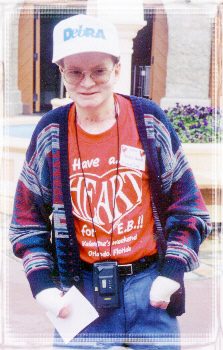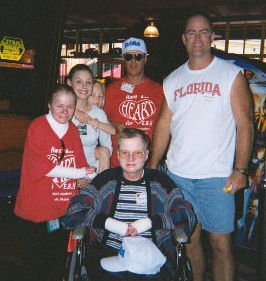By Bruce Gunn
As printed in the Summer 2000 issue of DebRA Currents

Bruce Gunn in DisneyWorld!
Bruce Gunn in February 2000 in DisneyWorld during the ‘Have a Heart for EB’ family event.
During my teenage years I knew I was beating the odds given to me at birth. With every birthday I was achieving the impossible.
In high school I was treated fairly equal to everyone else, needing few adjustments to make getting around easier. Getting out of each class five minutes early to be on time for the next class and drinking soda toward the end of the day, kept me from being tired for the last class and improved my attention capabilities. Both were small changes in my schedule that made a big difference in my school success.
I knew that after graduation I would be able to work, but did not know what I would do. My special education teacher was a great source of encouragement for me, telling me I could drive and live independently. It was in her class that I first used a computer, giving me direction for work.
Graduation was an important milestone in my life. At the time of graduation, 1986, I was 19 years old but still looked like a little boy. I proceeded into Vocational Rehabilitation to help me find a job. I was placed with Janus Developmental Services, Inc., a workplace for mentally and physically handicapped adults. Janus brings in work from area businesses for the clients to work on for a paycheck. After hand surgery in the fall of 1986, I was able to begin work at Janus in the spring of 1987. I started at a workshop in Tipton, Indiana, a small workshop with about 20 clients working.
I knew I wanted a job with computers and was able to work making computer labels for Fisher’s Guide. The job consisted of receiving orders from Fisher’s Guide on when the labels needed to be run, description and part number of what they were. These labels consisted of all sorts of part numbers and descriptions. We had to make sure we had the right label format and I needed to just learn the ropes of something new, knowing the different labels and part numbers. We also had to tear the labels and package them. At first I would tear off one at a time and soon learned how to do more than one at a time and do quality work at the same time.
After working at Janus for about one year I began thinking of moving on from the workshop to a community job. This would necessitate learning how to drive. Janus vans had provided transportation to and from work for those who couldn’t drive, but now I would have to drive myself. I knew that my Dad wouldn’t be the best one to teach me after seeing my two older brothers and sister go through it. I knew I needed someone more patient for a driving instructor. Vocational Rehabilitation sent me to Crossroads Rehabilitation Center in Indianapolis where I first learned to drive. On the first day I went to to downtown Indianapolis, the Monument Circle. By my second day of driving I went on Interstate 465 and passed a Semi going 70 mph After my first driving class, my mom came home and said to my dad: “Put your thinking cap on and change it, because your son is going to learn how to drive”. My dad wasn’t sure my leg reflexes were good enough to drive a car, but I knew I could do it. My special education teacher always helped by saying I was capable and I had the confidence in myself.
My driving lessons were three days a week for 21 sessions and would be like 6-8 weeks of driving education. I only needed 13 driving lessons, by the end of my 13th session, I got my license and found a car. On July 7, 1989 I got my license and my car, a 1986 Oldsmobile Ciera. I knew this was important for me to be more independent. Nobody told me I had to get my driver’s license,  I just wanted it and went for it. No one stepped me and it was my next major achievement in life.
I just wanted it and went for it. No one stepped me and it was my next major achievement in life.
February 2000 – Again in DisneyWorld.
Bruce Gunn in the wheelchair, surrounded by, on left, Jennifer DePrizio, her sister Jody being hugged by Taylor Cameron, Richard (Jennifer and Jody’s dad) and Randy Cameron
After working for 2 years, I began to get irritated-I wasn’t going on job assignments and it was hard to find a job I could do in the office. I needed a chance to try and an employer to five me a chance. As work was slowed down, around Christmas, I took time off from the workshop. In this way I could get their attention because I wasn’t happy still being in the workshop and wanted a community job. At one of the annual meetings, our workshop director mentioned that I wasn’t getting the credit I deserved, that I had worked long and hard for three years at the workshop. After all the work I had done for the organization, I appreciated the director/manager standing up for me.
At the end of May 1990, after being there for 3 years, a position became available in the Janus front office starting a data information computer system. This meant putting client’s data information in the system and typing the annual and semi-annual client reports required by state law as well as learning other skills in the office. I had to drive 30 minutes to Noblesville and knew the job would mean traveling. The secretary had known about me in the workshop and wanted me for a position as a receptionist at one of the other workshops, but I couldn’t take it because there was no central air in the workshop at the time. When this job became available at the office, she had me in mind. My social coordinator thought about it thought and I wasn’t happy with the social coordinator anyway: three months later in October of 1990 I wasn hired and began my training.
It is hard to believe I’ve been with Janus for 10 years now and have undergone many changes through it all. When we went without a receptionist and needed someone dependable, I was the one to fill in. I’ve worn many hats at Janus, taking on various responsibilities at the office. I have 5 case coordinators under me, one handling the adult clients 18 years or older in the workshop as well as 4 case coordinators for children who are developmentally delayed in their fine and gross motor skills and speech/language development for children under 3 years of age. We have about 150 children in the program and 65 adults. I type letters to Doctors, parents and type case conferences notices to be sent out, as well as keeping the data information system updated, typing annual and semi-annual client progress reports throughout the year in addition to being the backup receptionist when she is sick, at lunch or on vacation. Whatever needs to be done, I’m the one to do it for staff support in the office.
I’ve learned much in my ten years as an administrative aide. Until five years ago I didn’t even need to use my medical insurance, when I needed to have my first hand surgery. I have been using my insurance since then and the benefits are great, not to mention the pay is getting better.
If you are EBer you must never lose the dreams or goals you want to achieve in life. My parents never told me ‘no’ and I did what I was capable of doing within reason. I realize parents are protective of EB children, but you need to let them explore what life has to offer and at least encourage them to find out for themselves what they are capable of doing. Only your child knows his or her limits and not every EBer is capable of doing what they set out to do. I want’s always sure of myself, but I knew there wasn’t a cure for EB and sitting around wasn’t good for me either. I was on disability when I first turned 18 and got off when I started working full time. I wanted more than what disability could give me, but that was my choice.
Having RDEB isn’t easy and working full time isn’t always easy either. There are many days I go in whether I am sick or not, when I need to push myself, but that’s me. Co-workers would know if I wasn’t feeling well, or walking really slow because I broke out in blisters on my legs and knees, but I never complained and moved on. Now and then I will complain, but there is nothing wrong with that. I have learned to pace myself and do what I’m capable of doing and not worry about what I can’t and move on.
Focus on what you can do, not what you can’t. Parents, don’t give up hope for your child and think positively about your child’s future with EB. One day we will have a cure, so don’t stop living life and don’t think there is no hope for your EB child, because there is. I’m just one example of and EBer who is making it and there are many more out there.
